Fleurs du Mal Magazine


Or see the index
![]()
Konstantínos Kaváfis
(1863-1933)
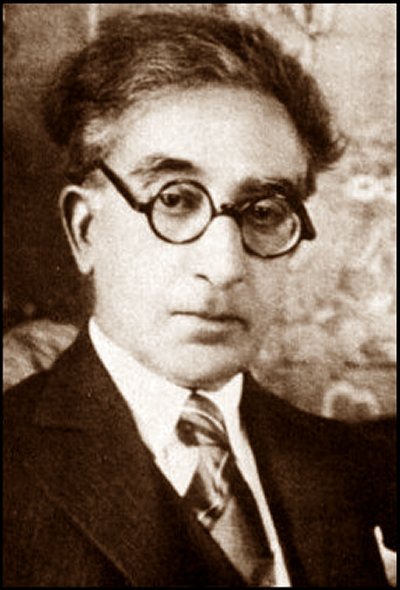
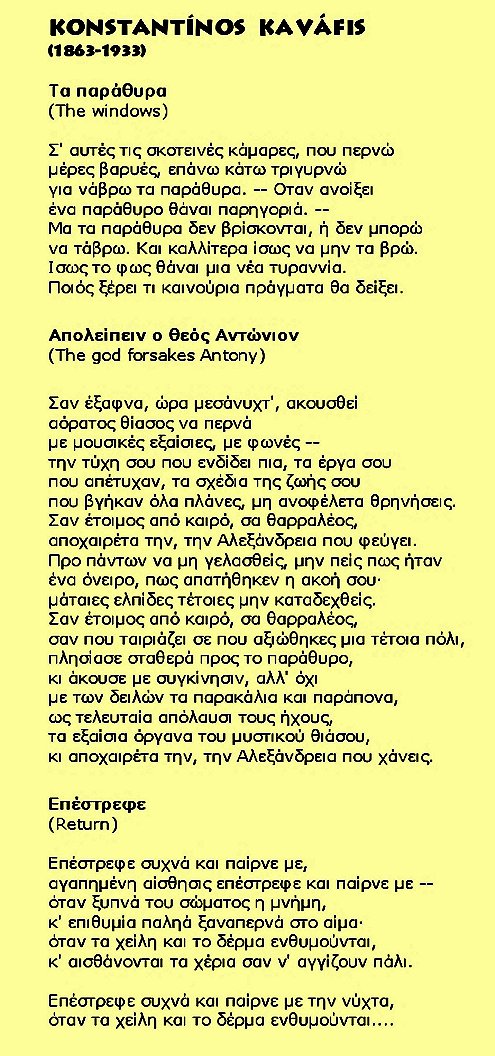
Kavafy poetry
fleursdumal.nl magazine
KEMP=MAG poetry magazine
More in: Archive K-L, Kaváfis, Konstantínos
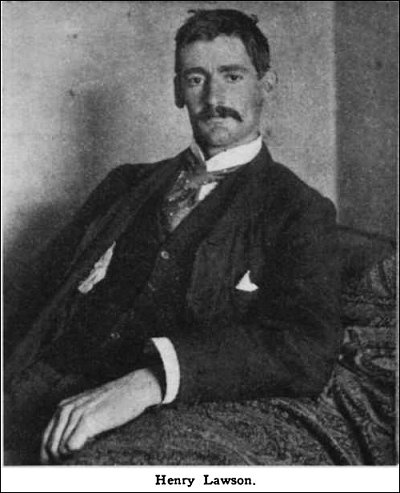
H e n r y L a w s o n
(1867-1922)
The Unknown God
A Phantasy of Optimism
The President to Kingdoms,
As in the Days of Old;
The King to the Republic,
As it had been foretold.
They could not read the spelling,
They would not hear the call;
They would not brook the telling
Of Writing on the Wall.
I buy my Peace with Slaughter,
With Peace I fashion War;
I drown the land with water,
With land I build the shore.
I walk with Son and Daughter
Where Ocean rolled before.
I build a town where sea was
A tower where tempests roar.
From bays in distant islands,
And rocks in lonely seas,
With unseen Death in silence
I smite mine enemies!
The great Cathedral crashes
Where once a city stood;
I build again on ashes
And breed on clotted blood!
I link the seas together,
And at my sign and will
The train runs on the ocean bed,
The great ship climbs the hill!
For pastime I flood deserts
With water from the rill;
And in my tireless leisure hours
I empty lakes, and fill.
I plumb the seas beneath us
And fathom skies above,
Yet I make Peace for hatred
And I make War for love.
I race beneath the ranges
And sit where Mystery dwells–
Yet mankind sees no changes,
They ask for “miracles!”
I own the world and span its
Lone lands from Pole to Pole;
I live in other planets,
Yet do not know my soul–
The soul that none may fathom,
Whose secrets none may tell,
The soul that none may humble,
The Soul Unconquerable!
I am the God of Ages!
I am the Unknown God!
My life is written pages
Wherever man hath trod.
From bounds of Polar regions,
To where the Desert reigns,
I’ve left my myriad legions
On countless vanished plains.
And I shall reign for ever
On earth while oceans roll,
In shape of man, or woman,
Through my immortal soul;
Yet I can love and suffer,
Be angry, or be mild,
And I can bow me down and weep
Just like a mortal child.
I conquer Death and Living,
And Fiends in shape of men,
For I rejoice in giving
Not to receive again.
For I am Man!–and Mortal!
And Mammon’s Towers must fall,
Though Greed draws all his pencils through
The Writing on the Wall!

Henry Lawson: The Unknow God
fleursdumal.nl magazine
More in: Archive K-L, Lawson, Henry

Federico Garcia Lorca
(1898-1936)
El Balcón
Si muero
Dejad el balcón abierto
El niño come naranjas
(Desde mi balcón lo veo)
El segador siega el trigo
(Desde mi balcón lo siento)
Si muero
Dejad el balcón abierto

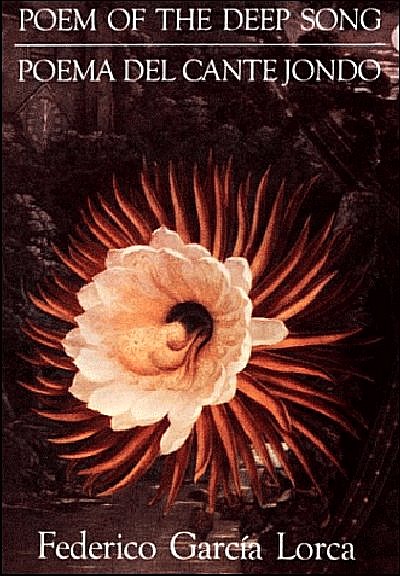
Soneto
Largo espectro de plata conmovida
el viento de la noche suspirando,
abrió con mano gris mi vieja herida
y se alejó: yo estaba deseando.
Llaga de amor que me dará la vida
perpetua sangre y pura luz brotando.
Grieta en que Filomela enmudecida
tendrá bosque, dolor y nido blando.
¡Ay qué dulce rumor en mi cabeza!
Me tenderé junto a la flor sencilla
donde flota sin alma tu belleza.
Y el agua errante se pondrá amarilla,
mientras corre mi sangre en la maleza
mojada y olorosa de la orilla.
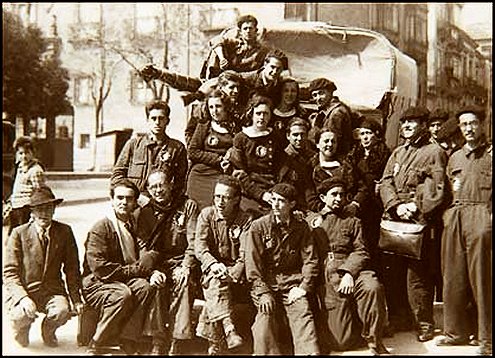
Federico Garcia Lorca poetry
fleursdumal.nl magazine
More in: Archive K-L, Garcia Lorca, Federico
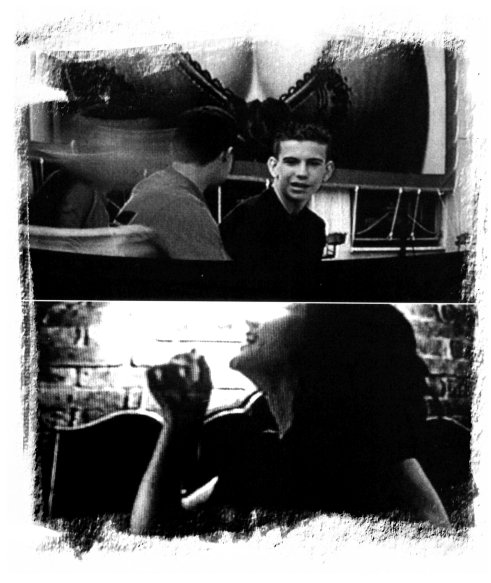
J e f v a n K e m p e n
g e d i c h t
N o r m
Het graf van de lezer is
voor mij een open boek,
want zelfs al blijkt het beeld
van de voorovergebogen dame
slechts een vage vlek op de muur,
(vergeef mij mijn zwak voor pikante details)
toch worden de mooiste en
onbestendigste van mijn dromen
ten alle tijden overvleugeld door
de kracht van mijn betoog:
het permanent en schaamteloos
verdraaien van de werkelijkheid,
als een wolk verstikkend gifgas
die door de regels raast
(meer dan 40 milligram per kubieke meter
dat is ver boven de veiligheidsnorm)
de met potlood onderstreepte woorden
voor altijd uitgewist,
het bloed van de lezer stroperig,
als het bloed van de ondode
die de angst om niet te sterven
een plaats geeft in waanzin.
Nee, liever eervol te sterven
dan als een lafaard te leven.
‘La-la-la ho-ho’ zong Rex Gildo
voordat hij voor altijd
uit het raam sprong
‘Es gibt dumme Tage
da geht alles schief
da kommen die Geister
die man gar nicht rief ‘.
Hoe troost je de achterblijvers?
Een dal van tranen?
Een stille tocht?
Een rake klap?
Wie schrijft
mag kieskeurig zijn.
Als brenger van het zwaard
beken ik al wat is gezegd
onder dwang
te hebben verklaard.
![]()
Jef van Kempen:
Laatste bedrijf, gedichten 1963-2008
Uitgeverij Art Brut
Postbus 117
5120 AC Rijen
ISBN: 978-90-76326-04-7
![]()
P O E M O F T H E W E E K
February 15, 2009
KEMP=MAG poetry magazine
More in: Archive K-L, Kempen, Jef van

D.H. Lawrence
(1885-1930)
How beastly the bourgeois is
How beastly the bourgeois is
especially the male of the species–
Presentable, eminently presentable–
shall I make you a present of him?
Isn’t he handsome? Isn’t he healthy? Isn’t he a fine specimen?
Doesn’t he look the fresh clean Englishman, outside?
Isn’t it God’s own image? tramping his thirty miles a day
after partridges, or a little rubber ball?
wouldn’t you like to be like that, well off, and quite the
thing
Oh, but wait!
Let him meet a new emotion, let him be faced with another
man’s need,
let him come home to a bit of moral difficulty, let life
face him with a new demand on his understanding
and then watch him go soggy, like a wet meringue.
Watch him turn into a mess, either a fool or a bully.
Just watch the display of him, confronted with a new
demand on his intelligence,
a new life-demand.
How beastly the bourgeois is
especially the male of the species–
Nicely groomed, like a mushroom
standing there so sleek and erect and eyeable–
and like a fungus, living on the remains of a bygone life
sucking his life out of the dead leaves of greater life
than his own.
And even so, he’s stale, he’s been there too long.
Touch him, and you’ll find he’s all gone inside
just like an old mushroom, all wormy inside, and hollow
under a smooth skin and an upright appearance.
Full of seething, wormy, hollow feelings
rather nasty–
How beastly the bourgeois is!
Standing in their thousands, these appearances, in damp
England
what a pity they can’t all be kicked over
like sickening toadstools, and left to melt back, swiftly
into the soil of England.
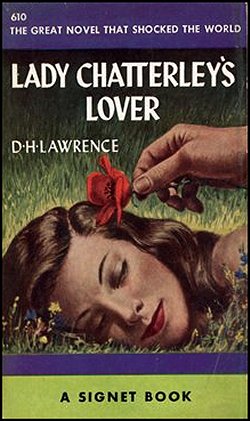
KEMP=MAG poetry magazine
More in: Archive K-L, Lawrence, D.H.
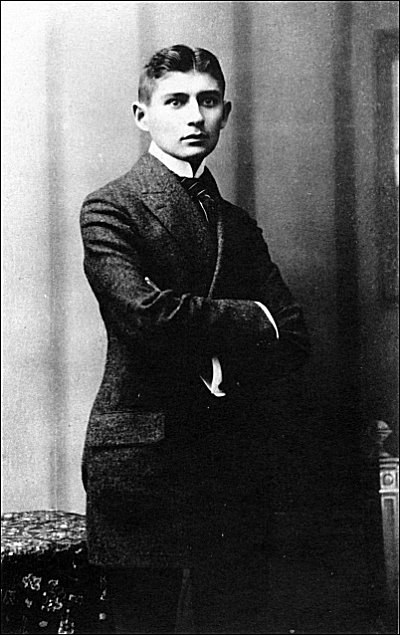
Franz Kafka
(1883-1924)
Schenkt sie mir
Schenkt sie mir
eure Liebe
ich
verdiene sie nicht
und wüßte auch nicht,
warum ihr das tun solltet
Ihr
die ihr davon viel habt in euren
Geisten und Herzen und Körpern
Mir
schenkt ihr sie
unverdient
und ohne Sinn
Schenkt sie mir
eure Liebe
B i t t e
fleursdumal.nl magazine
More in: Archive K-L, Archive K-L, Franz Kafka, Kafka, Franz, Kafka, Franz
.jpg)
Amy Lowell
(1874-1925)
A London Thoroughfare – 2 A.M.
They have watered the street,
It shines in the glare of lamps,
Cold, white lamps,
And lies
Like a slow-moving river,
Barred with silver and black.
Cabs go down it,
One,
And then another,
Between them I hear the shuffling of feet.
Tramps doze on the window-ledges,
Night-walkers pass along the sidewalks.
The city is squalid and sinister,
With the silver-barred street in the midst,
Slow-moving,
A river leading nowhere.
Opposite my window,
The moon cuts,
Clear and round,
Through the plum-coloured night.
She cannot light the city:
It is too bright.
It has white lamps,
And glitters coldly.
I stand in the window and watch the moon.
She is thin and lustreless,
But I love her.
I know the moon,
And this is an alien city.
Poem of the week – December 28, 2008
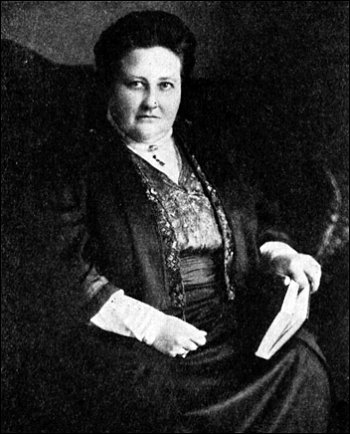
fleursdumal.nl magazine
More in: Archive K-L, Archive K-L, Lowell, Amy
.jpg)
W i l l e m K l o o s
(1859 – 1938)
Sonnet
Ik ben een God in ‘t diepst van mijn gedachten,
En zit in ‘t binnenst van mijn ziel ten troon
Over mij zelf en ‘t al, naar rijksgeboôn
Van eigen strijd en zege, uit eigen krachten.
En als een heir van donkerwilde machten
Joelt aan mij op en valt terug, gevloôn
Voor ‘t heffen van mijn hand en heldere kroon:
Ik ben een God in ‘t diepst van mijn gedachten.
— En tóch, zo eindloos smacht ik soms om rond
Úw overdierb’re leên den arm te slaan,
En, luid uitsnikkende, met al mijn gloed
En trots en kalme glorie te vergaan
Op úwe lippen in een wilden vloed
Van kussen, waar ‘k niet langer woorden vond.
More in: Archive K-L, Kloos, Willem
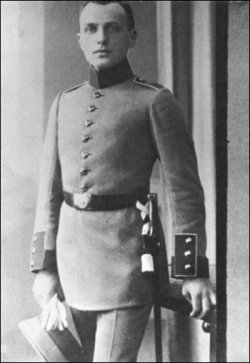
Alfred Lichtenstein
(1889-1914)
Die Nacht
Verträumte Polizisten watscheln bei Laternen.
Zerbrochne Bettler meckern, wenn sie Leute ahnen.
An manchen Ecken stottern starke Straßenbahnen,
Und sanfte Autodroschken fallen zu den Sternen.
Um harte Häuser humpeln Huren hin und wieder,
Die melancholisch ihren reifen Hintern schwingen.
Viel Himmel liegt zertrümmert auf den herben Dingen …
Wehleidge Kater schreien schmerzhaft helle Lieder. [?
.jpg)
Ein Generalleutnant singt
Ich bin der Herr Divisionskommandeur,
Seine Exzellenz.
Ich habe erreicht, was menschenmöglich ist.
Een schönes Bewustsein.
Vor mir beugen das Knie
Hauptleute und Regimentschefs,
Und meine Herren Generäle
Horchen auf meinen Befehl.
Wenn Gott will, beherrsche ich nächstens
Ein ganzes Armeekorps, nächstens.
Frauen, Theater, Musik
Interessieren mich wenig.
Was ist das alles gegen
Parademärsche, Gefechte.
Wäre doch endlich ein Krieg
Mit blutigen, brüllende Winden.
Das gewöhnliche Leben
Hat für mich keine Reize.
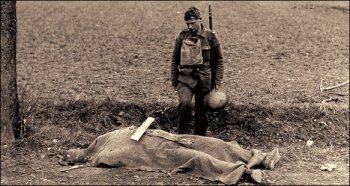
Abschied
Wohl war ganz schön, ein Jahr Soldat zu sein.
Doch schöner ist, sich wieder frei zu fühlen.
Es gab genug Verkommenheit und Pein
In diesen unbarmherzgen Menschenmühlen.
Sergeanten, Bretterwände, lebet wohl.
Lebt wohl, Kantinen, Marschkolonnenlieder.
Leichtherzig las zich Stadt und Kapitol.
Der Kuno geht, der Kuno kommt nicht wieder.
Nun, Schicksal, treib mich, wohin der gefällt.
Ich zerre nicht an meiner Zukünft Hüllen.
Ich hebe meine Augen in die Weit.
Ein Wind fängt an. Lokomotiven brüllen.
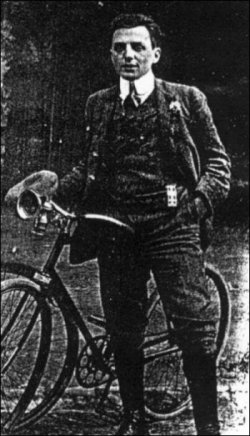
Abschied
(kurz vor der Abfahrt zum Kriegsschauplatz).
Vorm Sterben mache ich noch mein Gedicht.
Still Kameraden, stört mich nicht.
Wir ziehn zum Krieg. Der Tod ist unser Kitt.
Oh; heult mir doch die Geliebte nit.-
Was liegt an mir. Ich gehe gerne ein.
Die Mutter weint. Man musz aus Eisen sein.
Die Sonne fällt zum Horizont hinab.
Bald wirft man mich ins milde Massengrab.
Am Himmel brennt das brave Abendrot
Vielleicht bin ich in dreizehn Tagen tot.
fleursdumal.nl magazine
More in: *War Poetry Archive, Archive K-L, Expressionism, Lichtenstein, Alfred
.jpg)
Letitia Elizabeth Landon (L.E.L.)
(1802-1838)
THE SOLDIER’S GRAVE.
There’s a white stone placed upon yonder tomb,
Beneath is a Soldier lying:
The death-wound came amid sword and plume,
When banner and ball were flying.
Yet now he sleeps, the turf on his breast,
By wet wild flowers surrounded;
The church shadow falls o’er his place of rest,
Where the steps of his childhood bounded.
There were tears that feel from manly eyes,
There was woman’s gentler weeping,
And the wailing of age and infant cries,
O’er the grave where he lies sleeping.
He had left his home in his spirit’s pride,
With his father’s sword and blessing;
He stood with the valiant side by side,
His country’s wrongs redressing.
He came again, in the light of his fame,
When the red campaign was over:
One heart that in secret had kept his name,
Was claimed by the Soldier lover.
But the cloud of strife came upon the sky,
He left his sweet home for battle;
And his young child’s lisp for the loud war-cry,
And the cannon’s long death rattle.
He came again,–but an altered man:
The path of the grave was before him,
And the smile that he wore was cold and wan,
For the shadow of death hung o’er him.
He spoke of victory,–spoke of cheer:–
These are words that are vainly spoken
To the childless mother or orphan’s ear,
Or the widow whose heart is broken.
A helmet and sword are engraved on the stone,
Half hidden by yonder willow;
There he sleeps, whose death in battle was won,
But who died on his own home pillow!
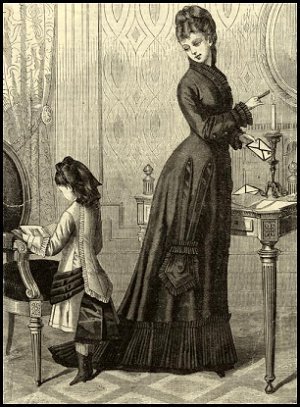
More in: Archive K-L
Thank you for reading Fleurs du Mal - magazine for art & literature